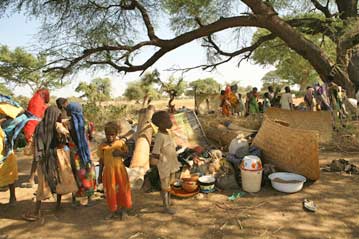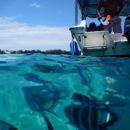Chad: Darfur refugees there to stay – By Celeste Hicks

“Didn’t you hear that last week there was fighting in Darfur!” said Saleh Souleyman, a refugee from Darfur as we sit in the shade in his small compound in Djabal refugee camp, near Goz Beida, eastern Chad to escape the afternoon heat. “It’s not safe. They killed 8 people!”
Ask any of the Darfur refugees who’ve been living in this region for the last eight years why they’re not returning home, and you’ll get a similar response. “˜The fighting still goes on’; ‘It’s not safe’; “˜It’s a question of security’.
While Darfur may have fallen from the headlines in recent years, it doesn’t mean that the conflict is over. Despite the death of its leader Khalil Ibrahim last year, the biggest rebel group JEM (Justice and Equality Movement) seems equally determined and has changed tack. Renowned Chad/Sudan expert Jerome Tubiana wrote recently that JEM has begun to move eastwards into South Kordofan to form alliances with the SPLA in Juba, and that the Sudanese government has moved away from the use of Arab Janjaweed militias to non-Arab ones which have continued to harass the Darfur population.
While the killings in Nyala last week, to which Saleh refers, were linked to a police crack-down on people protesting about the rising price of fuel and every day goods (similar to protests which originally broke out in Khartoum in June), refugees in the twelve Darfur camps in eastern Chad make little distinction. For them it’s just a continuation of the persecution of their people.
From 2007 onwards, Darfur became the ultimate forgotten African crisis elevated to primetime news bulletins. This was in part thanks to the efforts of Hollywood stars such as George Clooney and Mia Farrow who advocated on behalf of the 265,000 Sudanese refugees who fled to Chad and the millions more who were displaced inside Sudan and saw their homes and families destroyed.
But these days the camera crews are few and far between (George Clooney’s last visit was believed to have been in 2008), yet almost none of the refugees in eastern Chad have returned home. There has been some progress in returning displaced Chadians to their homes near the border with Sudan, but funding for refugee projects is drying up and many of the NGOs and humanitarians have left.
It is three years since I last visited the camps in eastern Chad, and it seems that life has settled into something approaching “˜normality’. Driving through the Djabal refugee camp I was impressed by how organised it was – seeing young girls waiting at the water point with clean jerry cans, and a long queue of women waiting patiently with their babies at the medical facility. Food rations given monthly seem to have helped the population avoid the worst of the malnutrition seen elsewhere in Chad after a poor harvest in 2011. Working with a team of Chadian Internews journalists from the popular Radio Sila in Goz Beida, I hear that most of the complaints these days are about water facilities, medical care and educational opportunities – no longer concerning women being raped and children attacked when they leave the camps to search for firewood.
The surrounding Chadian towns themselves have also changed dramatically. The last time I was in Goz Beida I donned a heavy helmet and drove through the central market place in an armoured personnel carrier with five Irish soldiers from the UN peacekeeping mission Minurcat. That scene is scarcely imaginable now as I watch the sun set over the sleepy market, a few children kick a ball around in the dust; a lone donkey wanders past the traders who are lying on mats beside their stalls, exhausted from Ramadan.
In 2008 and 2006 much of the refugee aid operation was turned on its head when Chadian rebels first from the FUC and later the UFDD charged through the east on their way to N’Djamena. At one point the town of Abeche, which must have once vied for the title of humanitarian capital of the world, was in rebel hands. Thousands were displaced by fighting between the ANT (Armee National du Tchad) and the rebels in the border regions. In the following years, UN and NGO operations became the target of “˜bandits’ who seemed spurred on by the presence of the UN Minurcat peacekeepers – thousands of NGO cars were stolen, drivers kidnapped and several aid workers were killed.
The Abeche of today seems to have quietly faded back into the desert, albeit with the addition of some handsome paved roads. I saw just a handful of expats and some French soldiers. As a testament to the efforts of the UN to make the operations sustainable here, many of the agencies are now being run by Chadians.
So why the change? In 2010 President Deby of Chad and Bashir of Sudan declared an end to their hostilities, which had seen both sides giving proxy support to rebels – from 2006 onwards JEM’s leadership was often seen in N’Djamena, and various UN reports made linkages between Khartoum and the Chad rebels. Bashir’s attention has almost certainly been diverted from Darfur by the simmering crisis with the newly independent South Sudan and the continual threats to choke vital oil revenues.
So will the refugees ever go home? The question provokes a gentle smile from the UNHCR representative I chat to. We cannot force people to return against their will, when the situation on the ground has calmed down sufficiently, is a common reply.
It’s something I give a lot of thought to on the plane back to N’Djamena. When I first came to Chad in 2008, I had just left Mali where things were too stable and ordered for my journalistic temperament and set off for a country that was on fire. Five years later I can scarcely believe how the tables have turned.
Celeste Hicks is a freelance journalist with a focus on African issues. She has a particular interest in the Sahel.






